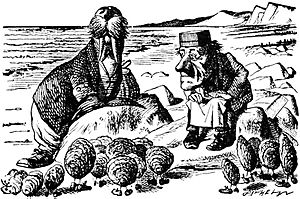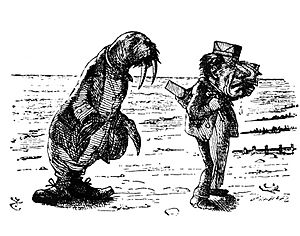The Walrus and the Carpenter facts for kids

"The Walrus and the Carpenter" is a famous story poem by Lewis Carroll. It first appeared in his book Through the Looking-Glass, published in December 1871. In the book, the characters Tweedledum and Tweedledee tell this poem to Alice. The poem has 18 parts, called stanzas, and 108 lines. It uses a special rhyming and rhythm style, much like old English folk songs.
The Poem's Story
The poem is about two main characters: a Walrus and a Carpenter. One night, they are walking on a beach where both the sun and moon are shining. They discover a group of oysters living in the sea nearby.
The Walrus and Carpenter invite some oysters to join them for a walk. Even though the oldest oyster doesn't approve, many more curious young oysters follow them. The poem mentions that the oysters are wearing neat shoes, which is funny because oysters don't have feet!
After walking along the beach, they all sit down on a low rock. The Walrus and Carpenter then bring out some bread, pepper, and vinegar. It soon becomes clear that the Walrus and Carpenter plan to eat the oysters! They eat all of them.
The Walrus feels a little bit bad for the oysters, but he eats them anyway. The Carpenter, however, doesn't seem to care at all. He just asks for more bread and complains that the butter is too thick.
After Alice hears the poem, she tries to decide which character is nicer.
"I like the Walrus best," said Alice: "because you see he was a little sorry for the poor oysters."
"He ate more than the Carpenter, though," said Tweedledee. "You see he held his handkerchief in front, so that the Carpenter couldn't count how many he took: contrariwise."
"That was mean!" Alice said indignantly. "Then I like the Carpenter best—if he didn't eat so many as the Walrus."
"But he ate as many as he could get," said Tweedledum.
This was a puzzler. After a pause, Alice began, "Well! They were both very unpleasant characters—"
Alice finally decides that both characters are not very nice.
The Poem in Pop Culture
"The Walrus and the Carpenter" is a very famous poem. Its lines and ideas have appeared in many movies, TV shows, songs, and books over the years.
On Television
- In a 1976 episode of The Bionic Woman called "Black Magic," the poem was used as a clue to find treasure.
- In the TV show Arthur, Buster Baxter reads lines from the poem and finds it confusing.
- The Doctor mentions "Shoes and ships and sealing-wax and cabbages and kings" in the Doctor Who episode "The Rings of Akhaten" when talking about things made by stars.
In Films
- In the 1934 Betty Boop cartoon Betty in Blunderland, the Walrus and Carpenter are shown with lobsters and clams.
- The poem is sung by Tweedledum and Tweedledee in Walt Disney's 1951 film Alice in Wonderland. In this version, the Walrus is a clever trickster, and the Carpenter is his less smart helper. The Walrus tricks the oysters into coming ashore, and then tricks the Carpenter so he can eat all the oysters himself.
- In the 1996 movie Harriet the Spy, the main character Harriet and her nanny often recite lines from the poem to each other.
- In the 2014 horror-comedy film Tusk, a character quotes a line from the poem: "The sun was shining on the sea, shining with all his might. He did his very best to make the billows warm and bright. And this was odd because it was the middle of the night!"
In Music
- The Beatles' 1967 song "I Am the Walrus" refers to the walrus in the poem. John Lennon later said he was sad when he realized the walrus in the poem was a villain.
- The song "That's What Living is to Me" by Jimmy Buffett includes the line "The time has come, the walrus said/and little oysters hide their head."
In Books
- A line from the poem was used by O. Henry for the title of his 1904 book Cabbages and Kings.
- In Agatha Christie's 1963 mystery The Clocks, Hercule Poirot quotes part of the poem.
- The character Anne quotes part of this poem in the book Anne of the Island when talking about college.
- In Arthur C. Clarke's 1982 novel 2010: Odyssey Two, the poem is playfully quoted about spaceships and monoliths.
- One of the stories in the 1998 Star Trek collection Star Trek: Strange New Worlds was named "Of Cabbages And Kings," a line from the poem.
In Plays
- In the play Journey's End, a character named Osborne quotes the poem before going into battle.
 | John T. Biggers |
 | Thomas Blackshear |
 | Mark Bradford |
 | Beverly Buchanan |


